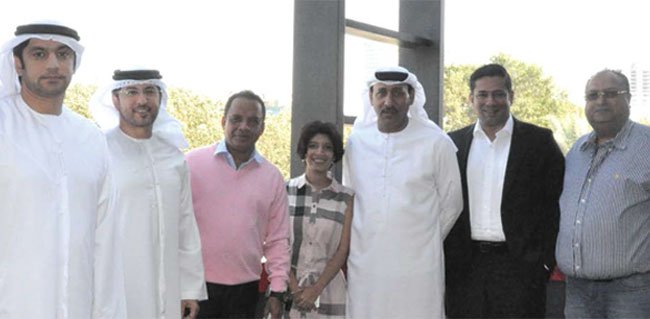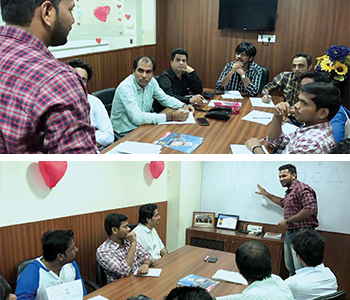You may have it heard said that successful people don’t have failures. They view all events as a learning process towards achieving their goals. If this is the case why is there growing criticism that younger industry talent seem to have lots of knowledge and qualifications but lack the fire to grow their career? Could it be that they lack an ability, to take time, to assess failure as a step towards promotion and success? Whilst mistakes and ill-fortune happen, talented people demonstrate their real skills and true metal; by the way they mitigate such events, possibly turning them into an advantage.
So what, if anything, has given rise to this situation?
Well, turn the clock back only forty years and you’ll find a time when the principle source of learning general communication skills came from within a family. Meals, where all generations ate and interacted together, were a regular feature. Values, traditions, customs, courtesy, social and verbal skills were passed onto younger family members. They were then able to develop them as appropriate for their generation.
But the internet has changed everything. Its phenomenal growth has overtaken what was usually slow social development and replaced it with a potential for an immediate global response. News from all corners of the world impacts on us 24/7. ‘YouTube’, ‘SnapChat’, ‘WhatsApp’, ‘FaceBook’ and ‘Twitter’ are just some of the current social media resources which influence and create social trends. These are outside what were our usual family, community, state and even a Country’s ethos and ambience.
Our younger generation is being influenced in a way which has never happened before. Yes, all generations are impacted by these changes in communication but the great difference is that the older generations have more experience to deal with them. The values of parents invariably influenced their children. This aspect has now, in many societies, been subjugated by what youngsters learn from social media. Values are learnt from the internet which question and challenge views being taught by parents.
Considering this background and applying it in the workplace focuses minds on the way different generations react. Whereas the middle-range and upper-management, generally in their youth, were used to having at least 30 seconds to consider an issue, (as demonstrated by the length of television adverts), today social media and interaction is often limited to 5 seconds. No time for thinking, just an immediate reaction. This is often why tweets and emails sent, with a quick click, lead to instant regret. What is needed, especially in business, is forward planning and considered responses. However this flies in the face of the social environment in which today’s students find themselves. On one hand at university, being required to study for their degrees and on the other hand, being expected by their peers to give fast responses. Clearly there is a potential conflict as it is not realistically possible to completely separate social skills from business skills. They are all part and parcel of the same thing – an ability to communicate and take decisions.
There is also a growing tendency for educators being encouraged to highlight the uniqueness of students. Unfortunately if you focus on believing you are unique, especially when a team member, it has a tendency to set you apart from others. A belief in uniqueness impacts on a person’s assertive nature. Everyone has their own particular unique talent. This needs to be nurtured but not at the expense of it becoming an excuse for lack of success. The claim that ‘YOU’ didn’t nurture my unique talent enough, as a means of blaming others for one’s own failure, is not a sustainable proposition. However it’s a view which can comfort those who lack motivation and determination.
This brings us back to our opening question. The growing criticism, about younger industry talent seeming to have lots of knowledge and qualifications but lacking the fire to grow their career, needs to be addressed. This is an important consideration for a company determined to build on its success. Once we realise and accept how rapidly changing social media has altered the way different generations interact; planning, training, encouraging and coaching younger staff members, within a company’s ethos, can be seen as ‘must have’ approach. Undoubtedly it will add invaluable corporate value to a workforce.
Youth brings a vibrancy that companies need. How a company benefits from this is going to be judged on the way intergenerational trust can be fostered and developed. Personality, assertiveness, bargaining and negotiation skills cannot be successful asserted if they are limited by social media experiences. Short attention spans limit an ability to see beyond failures towards a successful horizon. Herein lies the challenge for a progressive company – how to unlock the social media box and encourage younger talent to take control of their own vibrant potential to flourish.

 CSS Group has made remarkable progress in the Indian Sub-continent last year with a well reputed brand identity. Console Shipping Services India Pvt. Ltd. is today one of the front runners and a respectable brand within Shipping and Logistics. CSS India operates as three major regions namely Northern, Central and Southern regions which control major cities and gateway ports in their respective domains. Delhi being the centre at North India is progressing under Rajesh Arora, Vice President North India. CSS North Indian operations are evenly spread out with deep roots of business in-lanes created through Punjab, Haryana and other manufacturing centres of the Northern Region. “The demand for Logistics services has been largely driven by the remarkable growth of the Indian economy. The growth cannot be judged with any short term situation, but it is totally dependent on the infrastructural development and the policies adopted by the government. CSS India has got aspirations in gaining greater momentum in the region” Commented Rajesh Arora.
CSS Group has made remarkable progress in the Indian Sub-continent last year with a well reputed brand identity. Console Shipping Services India Pvt. Ltd. is today one of the front runners and a respectable brand within Shipping and Logistics. CSS India operates as three major regions namely Northern, Central and Southern regions which control major cities and gateway ports in their respective domains. Delhi being the centre at North India is progressing under Rajesh Arora, Vice President North India. CSS North Indian operations are evenly spread out with deep roots of business in-lanes created through Punjab, Haryana and other manufacturing centres of the Northern Region. “The demand for Logistics services has been largely driven by the remarkable growth of the Indian economy. The growth cannot be judged with any short term situation, but it is totally dependent on the infrastructural development and the policies adopted by the government. CSS India has got aspirations in gaining greater momentum in the region” Commented Rajesh Arora.

 CSS Oman will be offering end to end logistics solution from the country with its own infrastructure and a pool of trained team. Sultanate of Oman is going through a huge transformation stage in each and every sector. The influence of the Government in the infrastructural development is a key factor to assume that the Shipping & Logistics business is going to be highly prospective in this region. According to Frost & Sullivan, the logistics industry in Oman is likely to grow at a CAGR of 6.9% between 2015 & 2020. “Bringing up CSS Oman to the level of other offices of the group seems to be really challenging and encouraging at the same time. I am sure, with the team of professionals and the enthusiasm we have it is going to be a reality very soon. The support we have from the local authorities too is quite commendable” said Renjith Pillai, General Manager, CSS Oman
CSS Oman will be offering end to end logistics solution from the country with its own infrastructure and a pool of trained team. Sultanate of Oman is going through a huge transformation stage in each and every sector. The influence of the Government in the infrastructural development is a key factor to assume that the Shipping & Logistics business is going to be highly prospective in this region. According to Frost & Sullivan, the logistics industry in Oman is likely to grow at a CAGR of 6.9% between 2015 & 2020. “Bringing up CSS Oman to the level of other offices of the group seems to be really challenging and encouraging at the same time. I am sure, with the team of professionals and the enthusiasm we have it is going to be a reality very soon. The support we have from the local authorities too is quite commendable” said Renjith Pillai, General Manager, CSS Oman
 “We are pleased to meet our long time committed customers, Consolidated Shipping Services, and visit the CSS Headquarters and their Container Freight Station in Jebel Ali Free Zone. We welcome the significant capacity expansion the CSS Group has made with additional warehouse facility. The CSS Group is a proven partner of DP World in our mission to enable trade across the MENA and Indian subcontinent regions for over two decades. DP World, UAE Region looks forward to an even more productive future working with the CSS Group to build and support trade to and from Dubai and contribute to enhance Dubai’s position as the preferred trading hub of the Middle East” mentioned Mr. Abdulla Damithan.
“We are pleased to meet our long time committed customers, Consolidated Shipping Services, and visit the CSS Headquarters and their Container Freight Station in Jebel Ali Free Zone. We welcome the significant capacity expansion the CSS Group has made with additional warehouse facility. The CSS Group is a proven partner of DP World in our mission to enable trade across the MENA and Indian subcontinent regions for over two decades. DP World, UAE Region looks forward to an even more productive future working with the CSS Group to build and support trade to and from Dubai and contribute to enhance Dubai’s position as the preferred trading hub of the Middle East” mentioned Mr. Abdulla Damithan.
 A unique honor reached CSS Group through their Public Relations Officer Hassan Haji. Government Services, TAS-HEEL has awarded Certificate of Appreciation to Hassan Haji for Best Public Relation Manager recently. A veteran in the field of public relations and liaison activities within the UAE Hassan Haji Ghuloom Haji is working with CSS Group since 2002. Hassan is instrumental in handling the Visa formalities and statutory activities of the company and its staff members. “It is a great honor to have this appreciation from Tas-heel. Public Relation is an activity where you have to be pleasant and pleasing always and I believe that it is a skill rather than a job. CSS has always cared and considered their staff and I am proud to be with CSS Group, all these years,” commented Hassan while talking about the honor.
A unique honor reached CSS Group through their Public Relations Officer Hassan Haji. Government Services, TAS-HEEL has awarded Certificate of Appreciation to Hassan Haji for Best Public Relation Manager recently. A veteran in the field of public relations and liaison activities within the UAE Hassan Haji Ghuloom Haji is working with CSS Group since 2002. Hassan is instrumental in handling the Visa formalities and statutory activities of the company and its staff members. “It is a great honor to have this appreciation from Tas-heel. Public Relation is an activity where you have to be pleasant and pleasing always and I believe that it is a skill rather than a job. CSS has always cared and considered their staff and I am proud to be with CSS Group, all these years,” commented Hassan while talking about the honor. The CSS Group’s focus on expanding the 3PL vertical has not been just a flash in the pan idea; it has been a strategy in the offing for a while now. Today, the CSS Group offers our customers 10 different options or facilities across the UAE – covering temperature controlled, regular storage, standard racking & Open yard services.
The CSS Group’s focus on expanding the 3PL vertical has not been just a flash in the pan idea; it has been a strategy in the offing for a while now. Today, the CSS Group offers our customers 10 different options or facilities across the UAE – covering temperature controlled, regular storage, standard racking & Open yard services.
 CSS Chennai successfully handled one major movement of cryogenic tanks recently. During the first week of December 2016 the project was awarded to the CSS office and subsequently they received the confirmation to handle the project. An extensive study was conducted regarding the movement of the units and clearances needed in place for the movement of the 18 ton cargo with the volume specification of 03 x 40 OT and 01 x 40 FR. The scope of work included the cargo being taken out from the factory and moved all the way to the port through the congested city of Chennai. The climate too was totally adverse for the movement due to civil and political unrest during the time in the city of Chennai. “Chennai team of CSS did a commendable job in tacking all adversities and moving this cargo with utmost precision and care. I feel proud for my team” commented Sudarshan, Vice President, CSS South India.
CSS Chennai successfully handled one major movement of cryogenic tanks recently. During the first week of December 2016 the project was awarded to the CSS office and subsequently they received the confirmation to handle the project. An extensive study was conducted regarding the movement of the units and clearances needed in place for the movement of the 18 ton cargo with the volume specification of 03 x 40 OT and 01 x 40 FR. The scope of work included the cargo being taken out from the factory and moved all the way to the port through the congested city of Chennai. The climate too was totally adverse for the movement due to civil and political unrest during the time in the city of Chennai. “Chennai team of CSS did a commendable job in tacking all adversities and moving this cargo with utmost precision and care. I feel proud for my team” commented Sudarshan, Vice President, CSS South India. On 12 December, 2016 a Memorandum of Understanding was signed between the Dubai International Financial Centre (hereinafter referred as “DIFC”) and Ras Al Khaimah (hereinafter referred to as “RAK”) Free Trade Zone Authority, RAK Investment Authority and RAK International Corporate Centre to enhance the efficient enforcement of the Judgment and / or Orders pronounced by the DIFC Courts.
On 12 December, 2016 a Memorandum of Understanding was signed between the Dubai International Financial Centre (hereinafter referred as “DIFC”) and Ras Al Khaimah (hereinafter referred to as “RAK”) Free Trade Zone Authority, RAK Investment Authority and RAK International Corporate Centre to enhance the efficient enforcement of the Judgment and / or Orders pronounced by the DIFC Courts. The staff at CSS Mumbai witnessed a unique training session recently. The pens and pads they carried to the conference room proved to be of no use when the training started. It was all about Martial arts and self-defence techniques. Even though the session brought in surprises and beaming smiles on faces, in the hind sight, everyone agrees that the training they got was one of the most important lessons which the time demands in India.
The staff at CSS Mumbai witnessed a unique training session recently. The pens and pads they carried to the conference room proved to be of no use when the training started. It was all about Martial arts and self-defence techniques. Even though the session brought in surprises and beaming smiles on faces, in the hind sight, everyone agrees that the training they got was one of the most important lessons which the time demands in India. As part of our continuous commitment to the freight forwarding fraternity, CSS initiated a thank you scheme over 9 years ago, whereby one lucky name out of the scores of business cards that are dropped into the raffle bowls placed at the Delivery Order Counter will be rewarded with a gift.
As part of our continuous commitment to the freight forwarding fraternity, CSS initiated a thank you scheme over 9 years ago, whereby one lucky name out of the scores of business cards that are dropped into the raffle bowls placed at the Delivery Order Counter will be rewarded with a gift. CSS Group’s two senior staff members played this year’s Veteran’s Premier League held in Wayand, Kerala. Fida Asghar & Hareesh Haridas, two well-known names in the Cricketing circuits of Kerala & the UAE played for two different teams. While Fida Asghar played for the Absolute Sobers, Hareesh played with Kochi Royals. Interestingly both the team entered the finals after the league matches.
CSS Group’s two senior staff members played this year’s Veteran’s Premier League held in Wayand, Kerala. Fida Asghar & Hareesh Haridas, two well-known names in the Cricketing circuits of Kerala & the UAE played for two different teams. While Fida Asghar played for the Absolute Sobers, Hareesh played with Kochi Royals. Interestingly both the team entered the finals after the league matches.